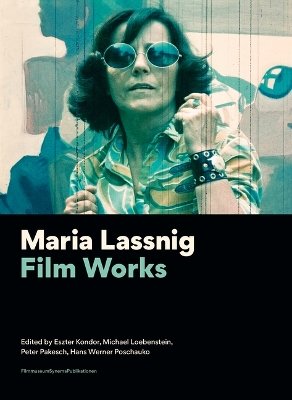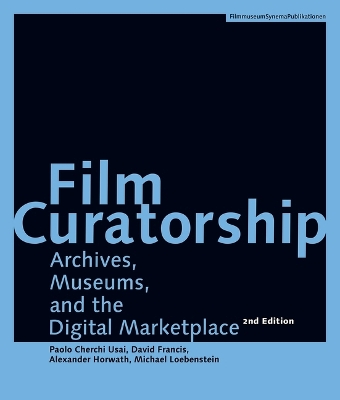FilmmuseumSynemaPublications
3 total works
Maria Lassnig – Das filmische Werk [German–language Edition]
by Eszter Kondor, Michael Loebenstein, Peter Pakesch, and Hans Werner Poschauko
Published 16 February 2021
Maria Lassnig (1919–2014) is internationally recognized as one of the most important painters of the 20th and 21st centuries. The leitmotif of her painting, the act of rendering her “body awareness” visible found additional expression in film in the early 1970s. During her time in New York, Lassnig studied animation at the School of Visual Arts and began to film in 8mm and 16mm. While several of these New York films have long since been part of her canonical works (e.g. Selfportrait, Iris, Couples, Shapes), many remained unfinished. These "films in progress" can be regarded as autobiographical notes as well as an artistic experiment featuring many of Lassnig’s recognizable sujets and methods. In 2018, this filmic legacy was restored and in many cases completed according to Lassnig’s original concept and instructions by two close collaborators, artists Hans Werner Poschauko and Mara Mattuschka, and presented to great international acclaim.
This German-language publication provides the first comprehensive index of Lassnig’s film works, offering insight into the filmmaker’s world of ideas through a wide selection of Lassnig’s own previously unpublished notes. It also includes a selection of Lassnig's "films in progress" on DVD. Two essays by James Boaden and Stefanie Proksch-Weilguni place Lassnig’s work in the context of the US-American film avant-garde of the 1970s, while conversations with Mara Mattuschka, Hans Werner Poschauko and the restoration team shed a light on the rediscovery of Lassnig’s fascinating films.
This German-language publication provides the first comprehensive index of Lassnig’s film works, offering insight into the filmmaker’s world of ideas through a wide selection of Lassnig’s own previously unpublished notes. It also includes a selection of Lassnig's "films in progress" on DVD. Two essays by James Boaden and Stefanie Proksch-Weilguni place Lassnig’s work in the context of the US-American film avant-garde of the 1970s, while conversations with Mara Mattuschka, Hans Werner Poschauko and the restoration team shed a light on the rediscovery of Lassnig’s fascinating films.
Maria Lassnig – Film Works
by Eszter Kondor, Michael Loebenstein, Peter Pakesch, and Hans Werner Poschauko
Published 23 February 2021
Maria Lassnig (1919–2014) is internationally recognized as one of the most important painters of the 20th and 21st centuries. The leitmotif of her painting, the act of rendering her “body awareness” visible found additional expression in film in the early 1970s. During her time in New York, Lassnig studied animation at the School of Visual Arts and began to film in 8mm and 16mm. While several of these New York films have long since been part of her canonical works (e.g. Selfportrait, Iris, Couples, Shapes), many remained unfinished. These "films in progress" can be regarded as autobiographical notes as well as an artistic experiment featuring many of Lassnig’s recognizable sujets and methods. In 2018, this filmic legacy was restored and in many cases completed according to Lassnig’s original concept and instructions by two close collaborators, artists Hans Werner Poschauko and Mara Mattuschka, and presented to great international acclaim.
This English-language publication provides the first comprehensive index of Lassnig’s film works, offering insight into the filmmaker’s world of ideas through a wide selection of Lassnig’s own previously unpublished notes. It also includes a selection of Lassnig's "films in progress" on DVD. Two essays by James Boaden and Stefanie Proksch-Weilguni place Lassnig’s work in the context of the US-American film avant-garde of the 1970s, while conversations with Mara Mattuschka, Hans Werner Poschauko and the restoration team shed a light on the rediscovery of Lassnig’s fascinating films.
This English-language publication provides the first comprehensive index of Lassnig’s film works, offering insight into the filmmaker’s world of ideas through a wide selection of Lassnig’s own previously unpublished notes. It also includes a selection of Lassnig's "films in progress" on DVD. Two essays by James Boaden and Stefanie Proksch-Weilguni place Lassnig’s work in the context of the US-American film avant-garde of the 1970s, while conversations with Mara Mattuschka, Hans Werner Poschauko and the restoration team shed a light on the rediscovery of Lassnig’s fascinating films.
Film Curatorship – Archives, Museums, and the Digital Marketplace
by Alexander Horwath, David Francis, Michael Loebenstein, and Paolo Cherchi Usai
Published 7 August 2020
What are the major issues and challenges that film archives, cinémathèques, and film museums are bound to face in the digital age and at a time when there is an expectation of access on demand? What is curatorship, and what does it imply in the context of film preservation and presentation? Is there a concept of “cinema event" that transcends the idea of film as “content” or “art” in the era of information?
Film Curatorship is an experiment: a collective text, a montage of dialogues, conversations, and exchanges among four professionals representing three generations of film archivists and curators. It calls for an open philosophical and ethical debate on fundamental questions the profession must come to terms with in the twenty-first century.
The first edition of this book was jointly published with Le Giornate del Cinema muto, Pordenone, Italy.
The second edition features a new preface by the authors.
Film Curatorship is an experiment: a collective text, a montage of dialogues, conversations, and exchanges among four professionals representing three generations of film archivists and curators. It calls for an open philosophical and ethical debate on fundamental questions the profession must come to terms with in the twenty-first century.
The first edition of this book was jointly published with Le Giornate del Cinema muto, Pordenone, Italy.
The second edition features a new preface by the authors.
![Cover of Maria Lassnig – Das filmische Werk [German–language Edition]](https://images.bookhype.com/covers/7b/a7/91575785-b99b-4ed5-a1f9-669b733d7ab7/9783901644856-7817c6cdf9b2a4e99c38dc.jpg)

